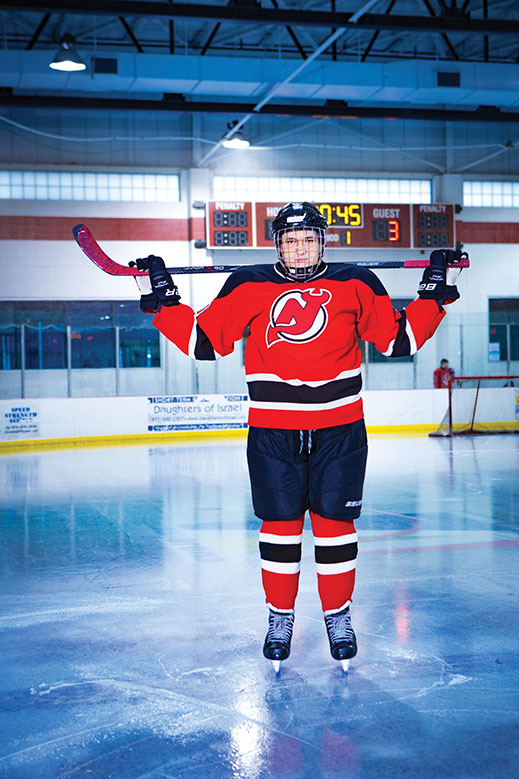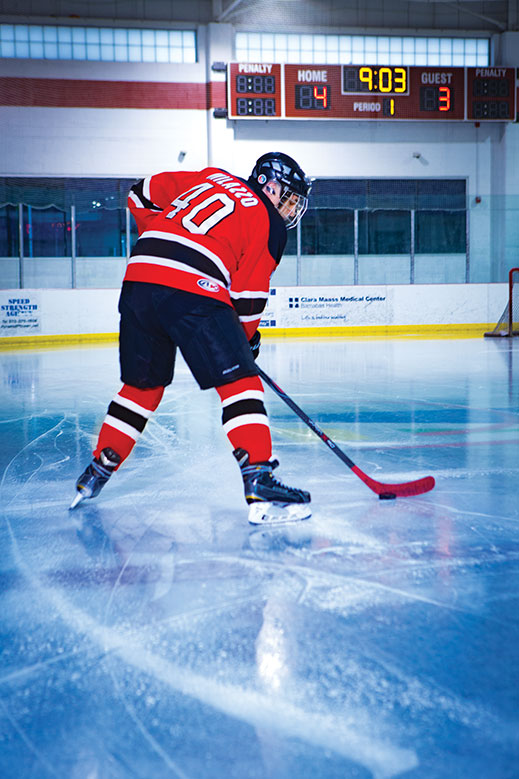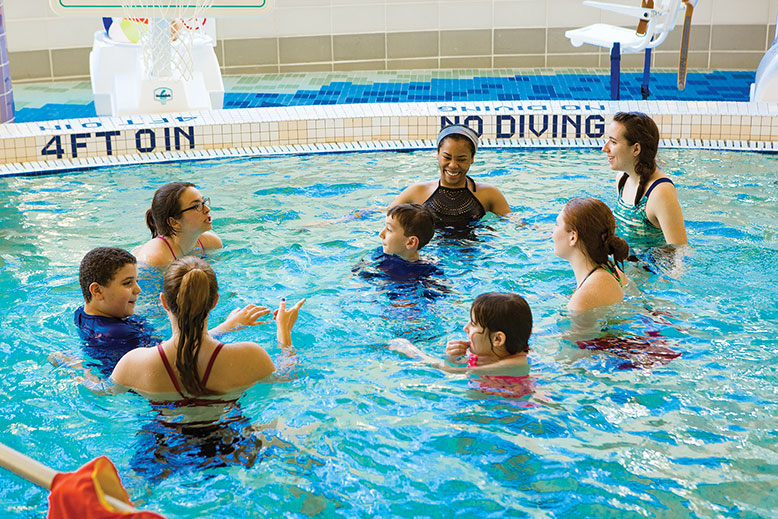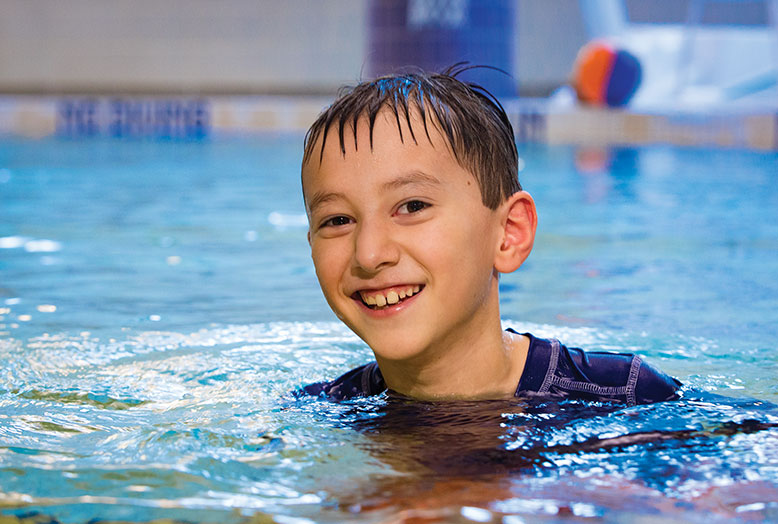
Will Milazzo is a nine-year veteran on the New Jersey Dare Devils, a hockey team for young people with autism and other developmental disabilities. Photo by Joe Polillio
Six feet tall and broad shouldered, Will Milazzo deftly handles his hockey stick and takes control of the puck at a practice at the Richard J. Codey Arena in West Orange.
“Hockey is my favorite activity,” says Milazzo, a nine-year veteran of the New Jersey Dare Devils, a team for young people with autism and other developmental disabilities. “I look forward to our Saturday practices all week.”
His father does, too.
“Allowing Will to play hockey was the best decision we ever made,” says Bob Milazzo. “We tried multiple therapies, but playing hockey has done the most to help him function at home and school.”
Will’s mother, Kelly, agrees. “Hockey expanded Will’s world,” she says. “For the first time in his life, he was part of a team. He had friends and belonged.”
Indeed, recreation has become a key component in the treatment of children and adults on the autism spectrum. Educators and physicians confirm that participation in sports, the arts and other leisure activities helps individuals with autism improve communication skills, recognize facial expressions and understand other people’s points of view. Leisure activities also enable individuals to practice the motor skills they learn in physical and occupational therapy. Concentration also improves—and that helps in school.
Will decided that ice hockey was for him after his mom read about the New Jersey Dare Devils in a local newspaper. Yet it took two years of pestering before his parents let him join the team. They were wary, fearing he could not overcome his sensory problems.
“He could not tolerate having a tag on any piece of clothing,” says Kelly. “I couldn’t see him wearing all that equipment, learning to skate and mastering the fundamentals.”
But the New Jersey Dare Devils are no ordinary team. They emphasize fun and self-esteem. Their brand of hockey is played without traditional penalties, and no contact is allowed. The team plays other squads of kids with similar conditions in New Jersey and New York, and participates in tournaments as far off as Canada. The travel schedule encourages Will’s parents to “raise the bar and allow him to assume more adult responsibilities,” says Kelly.
Encouraged by his peers on the team, Will, now 19, attends Warren County Community College, works part time for a shipping company and is looking forward to living independently.
Experts say a growing number of children and young adults with autism are participating in recreational programs in New Jersey. “There are now recreational programs in every part of the state,” says Suzanne Buchanan, executive director of Autism New Jersey, the largest statewide network of parents and professionals dedicated to improving the quality of life for individuals on the spectrum.
Buchanan credits the Americans with Disabilities Act—signed by former President George H.W. Bush in 1990—with raising awareness of the condition, increasing early evaluation, and encouraging treatment and services for autistic kids “to help them meet the challenges of the condition.”
New Jersey famously has the highest autism rate among children in the nation. No one knows why, says Buchanan—although it’s due at least in part to awareness and better diagnosis. One in 41 children from birth to age 21 has the condition in New Jersey compared to one in 68 among the 11 states tracked by the Centers for Disease Control and Prevention, according to its March 2016 report.
CDC researchers, who examined the health and educational records of 8-year-olds in those 11 states, found that New Jersey’s rate had increased 12 percent since its 2014 report, while the rate for the overall group had remained unchanged.
“But the good news,” says Buchanan, “is that traditional organizations in New Jersey that have provided sports opportunities for decades have developed special programs for kids with autism.”
In addition to arts organizations, she says theaters, museums and other cultural institutions have adapted their classes and programs so that kids with autism can participate. New groups have also pioneered programs to enable young adults who have aged out of school programs “to improve their skills and have fun.”
Finding a suitable activity is often a top priority of parents of children who have been newly diagnosed. Andrea Ford of North Brunswick was thrilled when she learned that Children’s Specialized Hospital in Mountainside offered a swimming class that her then 4-year-old son, Christian, could try.
“I wanted my child to have as normal a life as possible and to enjoy activities like his siblings do,” says Ford. “Although I am a teacher, I needed guidance in selecting an activity and helping him learn to play and get along in groups.”
Now in its 10th year, the hospital’s seven-week swim class is open to 3- to 11-year-olds with physical and mental challenges. About 40 percent of participants are children with autism.
“Safety is a major issue for parents of children with autism,” says Ford. “It was reassuring for me to know that Christian could be around water.”
Kaylee McGuire, coordinator of community recreation programs at Children’s Specialized Hospital, the largest provider of services for children with autism in the region, notes that no two individuals on the autism spectrum have the same symptoms. “Many factors must be considered when deciding on an activity,” she explains.
Some children may be fascinated by details of an object, such as the spinning wheels of a toy car. Or they may be fixated on an activity, like drawing maps. Other children engage in repetitive movements, such as rocking or spinning. Still others may be unusually sensitive to light, sound and touch, or changes in routine.
Certified therapeutic recreational specialists like McGuire also consider the children’s strengths when recommending activities. Forty-four percent of children on the autism spectrum have average or above-average intelligence, according to the CDC. In addition to mastering details, many children with autism demonstrate an outstanding ability to remember information. Some excel in math, science, music or art.
Many of the children are set in their ways. That means it’s essential to introduce new activities gradually, says Ford.
“When Christian started the swimming lessons, he was uncomfortable with water touching his hands or feet,” she says. “The staff had enormous patience and spent much time helping him to become comfortable.”
he growing awareness of autism and other developmental conditions that affect children’s ability to function has led to the expansion of programs like Special Olympics, founded in 1968 by Eunice Kennedy Shriver. Special Olympics New Jersey now offers 24 Olympic-style individual and team sports. That helps parents of children with autism find an activity that meets their child’s precise needs.
The year-round Special Olympics calendar includes summer standbys such as softball and tennis, as well as bocce and power lifting. During the fall, athletes participate in equestrian events, cycling, flag football and triathlon. Snowboarding and cross-country skiing are popular in the winter.
The YMCA of Burlington and Camden Counties sponsors a special-needs swim team called the Cyclones. “We have 20 kids in the program,” says Linda N. Davis, executive director of branch operations. “Some kids begin when they are 10 and come back year after year because swimming has become an integral part of their daily life.”
Special Olympic teams also help kids with autism make and keep friends, says Davis. By learning to take turns and work toward a goal, kids with autism learn to appreciate peers with a range of intellectual disabilities, cognitive delays and functional limitations.
Art is another leisure activity that can be beneficial to autistic children, especially those who have difficulty expressing their thoughts and emotions in words. Some are nonverbal.
“Art can be a welcome relief from the daily struggle to use words effectively,” says Elie Porter Trubert, executive director of the Center for Contemporary Art in Bedminster. “It can also be empowering, because in many other facets of the child’s life, the caregiver makes all the decisions.”
But in art, the child selects the image, what media to use, and how emotions and ideas are depicted. If a child dislikes the feel of clay, he can use paint or pencil. If a child is fascinated by circles, he can draw them again and again.
Originally a one-day program for children with autism, the center now has a year-round calendar of classes. Most of the children range in age from 6 to 15.
Art projects capitalize on the strengths of children on the spectrum, says Trubert. Some think in pictures. A few are so proficient in understanding spatial relationships, drawing, and other skills that they pursue careers in art.
Each session ends with an art show, where parents and caregivers have an opportunity to admire the children’s work and recognize their accomplishments.
This year, the Kaplen JCC on the Palisades in Tenafly will serve about 500 children with special needs. At least 85 percent of them have some form of autism. Offerings include a therapeutic nursery, after-school programs, two-week summer camps, and Sunday programs for school- aged children and young adults. Such recreational opportunities help kids learn the skills they need as they “move through the educational system and find their niches as adults,” says Shelley Levy, director of the Guttenberg Center for Special Services at the Kaplen JCC.
For example, learning to make eye contact and smile helps kids make friends in elementary school, she says. Noticing and interpreting body language and tone of voice can make the difference between a young person landing a job and remaining financially dependent on parents.
In the past, individuals with Asperger’s syndrome, a high-functioning form of autism, sometimes ended up socially isolated and struggling financially as adults, even though many are highly intelligent. Thanks to the therapeutic nursery, they are getting off to an optimal start, so that many graduates enroll in regular public and private schools.
The JCC’s nonsectarian nursery offers a 10-month program and a six-week summer session for 3- to 6-year-olds who are bright and have high-functioning autism, attention deficit hyperactivity disorder and other developmental disabilities. Teachers use puppets, role playing and stories to help the kids identify different social settings and what is expected in classrooms, at parties and on playgrounds.
With the first widely diagnosed group of children on the spectrum reaching adulthood, a new challenge has emerged: providing innovative programs that will enable adults with autism to have a quality life.
To meet this need, the Kaplen JCC offers Project PALS, an after-school program on Tuesdays for 15- to 21-year-olds and a transitions program on Sundays for 14- to 22-year-olds. The transition program combines activities like swimming and music with training in life skills like cooking.
“In addition to planning and preparing a meal, engaging in conversations over dinner can help young adults develop the skills they need to live independently,” says Levy. “Friendships are very important to young adults because many of them are no longer in school, and their parents may have health problems or other issues.”
Pat Weindorfer, a former board member and committee member of Autism Society Southwest New Jersey, predicts that there will be more recreational activities for adults with autism because parents and siblings have developed skills in advocating and networking.
“Twenty years ago there were no Christmas parties, hayrides or bowling leagues for kids with autism, so our activity committee created them,” says Weindorfer. “Now these activities are being adapted for kids in their 20s who still function at the level of a 5-year-old, as well as those who are working and living independently.”
Sharon Johnson is a New York City freelance reporter specializing in health care.
Dare Devils Dare Not Be Different




Hi.. This is great but, there are parts of the article missing. The entire section on New Jersey All People Equal http://www.NJAPE.org , Cornerstone Montclair and Know Your Rights is missing